Why You Shouldn’t Be Afraid to Use Antiperspirants, According to Dermatologists

Our editors independently select the products we recommend. We may earn a commission on items bought through our links.
Science is fantastic: Just ask any sweaty person who relies on aluminum-packed antiperspirant to halt their misery on a humid day or after an intense workout. Better yet, ask their partners, colleagues, or gym fellows, because a reduction in perspiration decreases stink, given that sweat is where odor-producing bacteria tend to congregate. So why, then, does antiperspirant sometimes get a bad rap? To know it is to love it, and anyone wondering how antiperspirants work is only likelier to embrace the science behind sweat stoppage.
Today's Top Deals
The active aluminum-based ingredients in antiperspirants form a temporary plug within sweat ducts, said Kelly Dobos, former President of the Society of Cosmetic Chemists and current Chair of the SCC’s Ohio Valley Chapter. “They stop or slow the flow of sweat to the surface of the skin,” she added. “If application of antiperspirant is stopped, the plugs break down and are eventually pushed from the glands so that normal sweating resumes.”
The safety of all sweat-blocking substances has been questioned, and there’s a common false claim that antiperspirants are responsible for certain cases of breast cancer and Alzheimer’s. All three experts SPY interviewed for this piece agree that antiperspirants, and specifically aluminum-based ones, are safe. Dr. Corey L. Hartman, founder of Skin Wellness Dermatology in Birmingham, AL, and Dr. Susan Massick, board-certified dermatologist at Ohio State University’s Wexner Medical Center gave votes of confidence to both their safety and efficacy. Antiperspirants actually work, and quite well. The best of the bunch even keeps skin dry for up to four days, or 96 hours.
What the Experts Say
There are two categories of aluminum active ingredients that contain aluminum that the US Food and Drug Administration (FDA) allows: aluminum chlorohydrates and aluminum zirconium chlorohydrates. “In general, the aluminum-zirconium chlorohydrates are the most effective,” said Dobos. “Though they are not permitted in aerosols due to inhalation concerns.”
Dobos said not to get lost in the weeds of interpreting ingredient labels, since there are so many possible aluminum derivatives used, and they come with a bunch of different percentages. “Efficacy isn’t always about percentage, and the maximum allowance for each is set in the regulations,” she clarified. “Efficacy can be influenced by the particle size of the active ingredient, the particulars of other ingredients, and the delivery system itself — whether that’s a stick, aerosol, cream, or roll-on.”
Is Antiperspirant Safe?
All three experts interviewed are aligned on the safety of antiperspirants, and specifically the use of aluminum to stop sweat.“I don’t vilify aluminum,” said Hartman. “Aluminum has a bad rap because decades-old research went viral, which tied an excess amount of aluminum to Alzheimer’s disease. However, that research was deemed to be unreliable. There is no direct link between aluminum in antiperspirant and Alzheimer’s disease.”
According to Hartman, the concern about aluminum in antiperspirant’s close proximity to breast tissue, and that causing breast cancer, is unfounded in research. “There isn’t a direct scientific link on that concern either, so if you use a product with aluminum that works and you use it as directed, I wouldn’t be concerned. I consider aluminum safe and not toxic.”
It is safe to use antiperspirants in any areas where you sweat, said Massick. This includes the groin in men, palms, and soles, as well as under the breasts in women. However, this green light comes with a caveat.
“Remember that these ingredients can cause irritation for some, especially in those with sensitive skin.” Dobos added that use near broken skin or any other internal body parts (mucous membranes) should also be avoided.
Alternatives for Aluminum
The alternative to aluminum antiperspirant is natural deodorant, a product that controls odor and moisture rather than blocking sweating altogether. There are a few different key ingredients used in natural deodorants, each with its own pros and cons. Dobos is reluctant to endorse any such ingredient over the efficacy of antiperspirant, so we recommend measuring expectations.
Massick called out baking soda as one of the most common options, but even this is a hotly contested ingredient since it disrupts pH levels on the skin. She recommended testing “a small area first, and limit the duration you leave it on the skin.”
According to Dobos, these are three less controversial ingredients:
Starches: Like tapioca starch and cornstarch. These are also common in anti-chafing and anti-swamp crotch remedies since they help absorb sweat.
Cyclodextrins: Ring-shaped molecules produced in the degradation of starches. “These form a cage around odor-causing chemicals to prevent you from being able to smell them,” said Dobos.
Zinc ricinoleate: This is derived from castor oil, and helps neutralize odors, she added.
But Dobos remains unconvinced that any of these natural ingredients hold a candle to the sweat-duct-plugging powers of aluminum. “To be honest, antiperspirants are the most effective at preventing odors,” she said. “Deodorant just doesn’t work as well and I trust the safety and science behind antiperspirants.”
The Best Antiperspirants
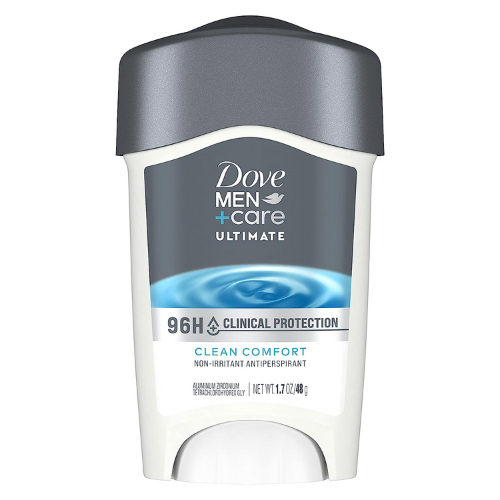
BEST OVERALL
Dove Men+Care Ultimate Clinical Protection Antiperspirant Clean Comfort Stick
Buy Now On Amazon
This author, who is also a grooming expert, almost always buys this when he’s not receiving dozens of products to test and just needs to buy something from the store for himself.
This product not only provides up to 96 hours of sweat defense but also has Dove’s signature blend of 1/4 moisturizing ingredients to keep skin nourished and satisfied. Its subtle “Clean Comfort” scent gives off that “fresh from the shower” essence, and the brand has made a product that is fully recyclable upon completion, too.
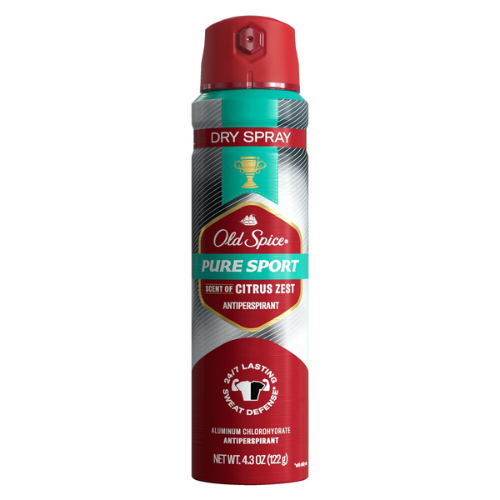
BEST AERSOL
Old Spice Pure Sport High Endurance Antiperspirant
Buy Now
Delivery Method: Spray-on aerosol can target the problem area. Spray for 1-2 seconds from about six inches away.
Why It’s Great: Few brands are as nostalgic and omnipresent as Old Spice, that trusted companion for every elementary school kid in the gym locker room. This won’t discolor white fabric or stain colors with white streaks, either.
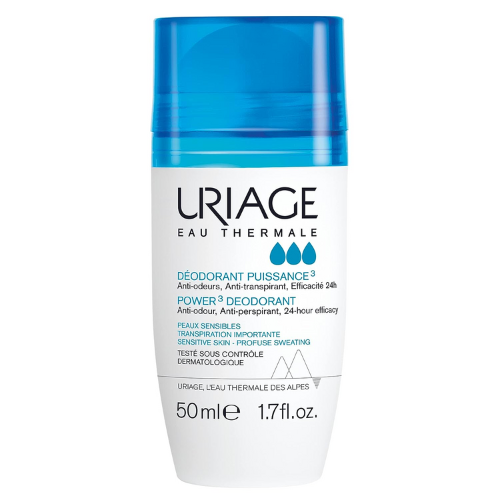
BEST FOR HYPERHIDROSIS
Uriage Clinical Strength Antiperspirant Deodorant
Buy Now On Amazon
Delivery Method: Here’s an old-school roll-on deodorant that delivers liquid product as you rub it across the skin.
Why It’s Great: Hartman notes that, while prescription antiperspirants exist to help patients with an overproduction of sweat (AKA hyperhidrosis), there are still terrific over-the-counter options like this one. “Uriage’s is really long-lasting and is the best at regulating sweat,” he said.
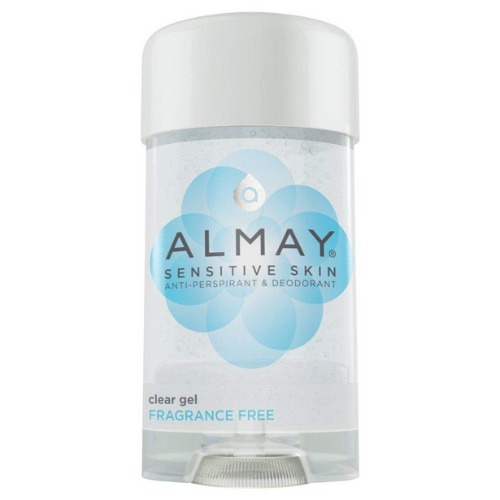
BEST FOR SENSITIVE SKIN
Almay Sensitive Skin Antiperspirant and Deodorant
Buy Now On Amazon
Delivery Method: Gel; twist the dial to release gel, and roll it onto skin.
Why It’s Great: While Hartman’s favorite sensitive-skin antiperspirant is Vanicream Antiperspirant Deodorant, it is also hard to track down and frequently out of stock. So look to this alternative, which should satisfy people with skin conditions like eczema and contact dermatitis. Also, ignore that Amazon says it’s “for women.” It’s for everyone, that’s just a marketing ploy.
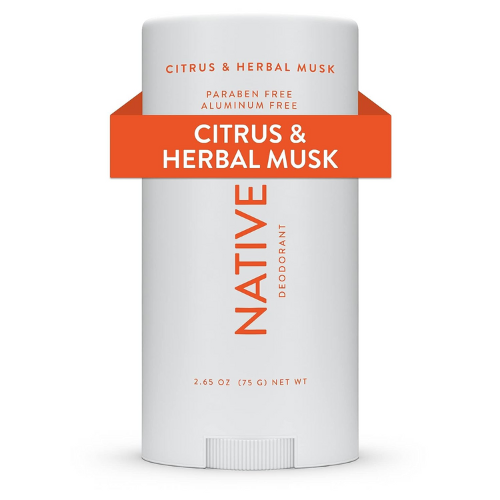
BEST MOISTURE-ABSORBING NATURAL DEODORANT ALTERNATIVE
Native Deodorant
Buy Now On Amazon
Buy Now at target
Key Ingredients: Baking soda prevents moisture accumulation, probiotics counter the stinky “bad” bacteria, and coconut oil works with shea butter to nourish skin.
Why It’s Great: “My patients really love Native,” said Hartman. “It has a range of scents so you can choose one to your liking, and baking soda can help neutralize odor.”
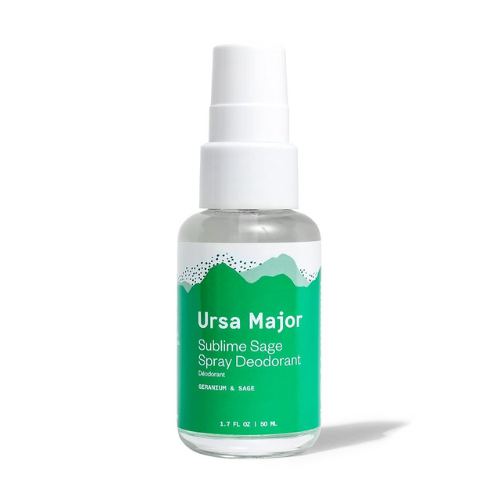
BEST NON-BAKING SODA NATURAL DEODORANT ALTERNATIVE
Ursa Major Sublime Sage Spray Deodorant
Buy Now On Amazon
Key Ingredients: Tapioca starch absorbs moisture, hops neutralizes funky smells, probiotic enzymes fight off the odorous bacteria, and there’s a soothing mix of aloe, chamomile, and shea butter.
Why It’s Great: Ursa Major is the top brand to trust with anything natural, due to their commitment to humans and the planet. They’ve got five natural deodorants to choose from, this gentler option, two with baking soda, and two spray-ons.
Frequently Asked Questions About Aluminum and Antiperspirants
Does all sweat cause odor?
Bacteria proliferate in moist areas and cause odor. The bacteria metabolize the sweat and their waste creates a foul smell. Here’s an interesting fact, though: There are two different kinds of sweat, eccrine and apocrine, and one of them is much more responsible for odor. “Eccrine sweat consists mainly of water and salt and helps the body to regulate temperature,” said Dobos. “Apocrine sweat results from emotional stress, like what you might have experienced on a job interview or while taking an exam. It is the microbial breakdown of apocrine sweat that produces the most pungent odors.”
Might be time to try some mindful meditation before your Hinge date gets to the bar. If that’s motivation to self-soothe anxiety, I don’t know what is.
Can you apply antiperspirant anywhere?
Yes, you can apply antiperspirant to any body part that sweats, within reason. Dobos suggests avoiding broken skin or any internal body parts (like mucus membranes). Still, it is perfectly fine to apply deodorant around the groin, under the soles of the feet, under the breasts, and other sweaty spots.
“Antiperspirants are most effective in places where you have the most active apocrine sweat glands like armpits and groin as well as the eccrine sweat glands, which are concentrated in your armpits, palms, and soles of your feet,” she said.
How do antiperspirants differ from deodorant, in terms of stopping sweat?
“Antiperspirants, with ingredients such as aluminum chloride, act by forming a plug that blocks the secretion of sweat from the eccrine glands,” said Massick. “Deodorants often contain fragrances to neutralize odors and bacteria by creating a more acidic pH on your skin to try to combat odor from the apocrine glands.” They may also use moisture-absorbing ingredients to prevent the area from becoming moist, which limits bacterial proliferation and in turn, limits the odors produced by those bacteria.
When is the best time to apply antiperspirant?
Antiperspirant is best applied after showering, in the evening, and before bed. “Most people sweat less in the evening, which gives the product time to absorb into the skin,” said Hartman. “But if you shower in the morning, there’s no reason why you can’t apply it after your shower.”
More Top Deals from SPY
Best of SPY
